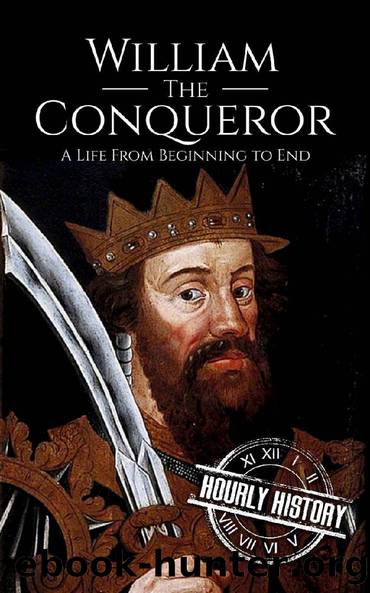William the Conqueror: A Life From Beginning to End (Biographies of British Royalty Book 13) by Hourly History

Author:Hourly History [History, Hourly]
Language: eng
Format: epub
Publisher: Hourly History
Published: 2018-01-02T00:00:00+00:00
Chapter Six
English Resistance
âThey [the Normans] built castles far and wide throughout the land, oppressing the unhappy people, and things went ever from bad to worse.â
âAnglo-Saxon Chronicle, 1067
Modern historians sometimes act as though William the Conquerorâs defeat of King Harold II completed the Norman conquest of England. The true story of the months and years after the Battle of Hastings is that the Normans knew no peace from their English subjects.
Instead of marching directly to London, William took a circular route, burning a ring around the city as a defensive and oppressive strategy. He met significant resistance as he traveled around the city. After learning of Harold IIâs death at Hastings, the Witan had proclaimed the last male member of the royal house of Wessex, Edgar Atheling, as king. Born in Hungary to his father, Edward the Exile, the young Edgar had returned to England in roughly 1057. Although Edward the Confessor was clearly aware of his grand-nephew at that stage of events, he made no effort to push Edgar into the role of heir to the throne. The boy was too young to be a military leader, especially with men like Harold Godwinson and the Duke of Normandy eyeing the throne. The most powerful members of the old order supported Edgar, but historians doubt that the resistance against William was particularly strong at this point. Most of Haroldâs army had been destroyed, and Williamâs battles in Kent and the other districts surrounding London had made organized resistance in 1066 difficult.
But London itself was completely uninterested in surrendering to William. He had thought to march into the city over London Bridge but found the city barred to him. So William marched through Surrey, Hampshire, and Berkshire, burning the lands as he went. It wasnât until the close of the year that London relented and allowed William into the city.
Thus ended the official resistance to William of Normandy. The most powerful men in LondonâEarl Edwin of Mercia, Earl Morcar of Northumbria, Archbishop Ealdred of York, and Edgar Athelingâoffered hostages and swore oaths of fealty to William. And on December 25, 1066, William was crowned King of England.
The Norman conquest of England made permanent changes to Englandâs landscape. After his coronation, William laid claim to all of the land in England, then stated that a fifth of the land would be retained for his own use, while a quarter of it was granted to the church. The rest of the land that made up England at the time was divided between the 170 âtenants-in-chiefââlater called baronsâwho fought with William at the Battle of Hastings. The barons were then responsible for providing knights for Williamâs army; the number of knights provided was calculated based on the amount of land each baron had been granted.
When a man was made baron, he knelt before the king and said, âI become your man.â He promised to remain faithful for the rest of his life, placing his hand on the Bible as he did so. The barons then conducted a similar ritual with the men they chose as knights.
Download
This site does not store any files on its server. We only index and link to content provided by other sites. Please contact the content providers to delete copyright contents if any and email us, we'll remove relevant links or contents immediately.
Blood and Oil by Bradley Hope(1558)
Wandering in Strange Lands by Morgan Jerkins(1419)
Ambition and Desire: The Dangerous Life of Josephine Bonaparte by Kate Williams(1387)
Daniel Holmes: A Memoir From Malta's Prison: From a cage, on a rock, in a puddle... by Daniel Holmes(1332)
Twelve Caesars by Mary Beard(1314)
It Was All a Lie by Stuart Stevens;(1295)
The First Conspiracy by Brad Meltzer & Josh Mensch(1167)
What Really Happened: The Death of Hitler by Robert J. Hutchinson(1161)
London in the Twentieth Century by Jerry White(1145)
The Japanese by Christopher Harding(1131)
Time of the Magicians by Wolfram Eilenberger(1125)
Twilight of the Gods by Ian W. Toll(1117)
Cleopatra by Alberto Angela(1094)
A Woman by Sibilla Aleramo(1092)
Lenin: A Biography by Robert Service(1074)
John (Penguin Monarchs) by Nicholas Vincent(1068)
Reading for Life by Philip Davis(1024)
The Devil You Know by Charles M. Blow(1024)
The Life of William Faulkner by Carl Rollyson(983)
